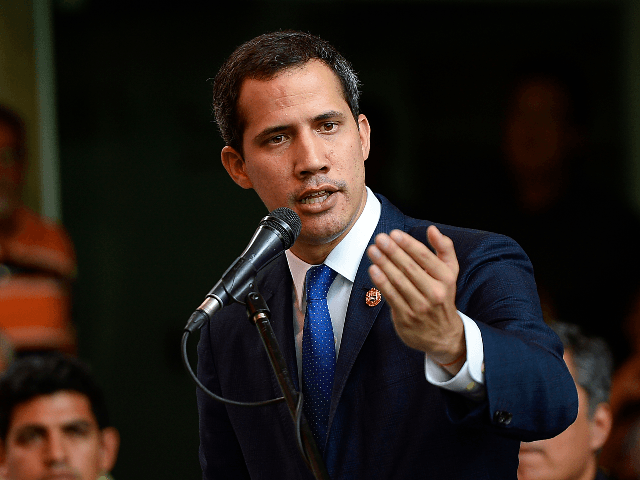Lawmakers supporting Venezuelan dictator Nicolás Maduro filed charges Thursday against President Juan Guaidó for what they called a “looting campaign” of corruption by opposition leaders, apparently a first step to imprisoning the president.
Guaidó himself recently announced his administration would launch an investigation into senior members accused of stealing money from funds sent them intended as humanitarian aid for Venezuelan refugees in Colombia. Guaidó denied any involvement and insisted that he would bring to justice anyone misappropriating funds.
The group of lawmakers filing their grievances with Maduro’s Attorney General Tarek William Saab accused Guaidó and his team of stealing profits from Citgo Oil, the U.S. corporate entity affiliated with Petróleos de Venezuela (PDVSA), the state-run oil company. Given that Guaidó is legally the president of Venezuela and Maduro is not, the administration of President Donald Trump granted Guaidó control over Citgo.
The Maduro lawmakers also demanded an investigation into the corruption that Guaidó himself exposed among his ranks in pursuit of criminal repercussions for the president.
“We received this grave accusation made public … which will reveal that whole long list of corruption that involves Juan Guaidó and other lawmakers,” Saab said on Thursday, according to Maduro’s state-run media service.
Humberto Calderón Berti, a former ambassador now leading the charges against Guaidó, claimed that the head of Guaidó socialist Popular Will party, the former longtime political prisoner Leopoldo López, was the head of “this criminal mafia” allegedly splitting Citgo profits “like it was their personal loot.”
Juan Guaidó became the president of Venezuela legally in January, following the “inauguration” of Maduro that month. Maduro claims legitimacy through winning the May 2018 presidential election – an election in which he banned non-approved leftist candidates and engaged in widespread fraud to silence the opposition. At the time, opposition leaders also urged supporters not to vote in the election to take away any claims to legitimacy, resulting in the lowest turnout for a presidential election in history.
In the event of a “rupture in the democratic order,” in which a sitting president refuses to vacate the office, the Venezuelan constitution allows the legislature, the National Assembly, to appoint an interim president tasked with organizing elections as soon as possible. The National Assembly gave that honor to Guaidó, accepted by most of Latin America and the free world as the legitimate head of the state of Venezuela.
Maduro has refused to yield power to Guaidó and maintains control over the nation’s armed forces, making it impossible for Guaidó to exercise any of his constitutional powers. Many in the upper ranks of the military are tied to Maduro through participation in the Cartel de los Soles, a multicontinental drug trafficking syndicate run by Venezuelan soldiers. Extensive evidence also ties Maduro to profits from ties to the Iranian-Lebanese terrorist organization Hezbollah through his former vice president, Tareck El Aissami. El Aissami is currently the Minister of Industries for Maduro, meaning he controls the nation’s oil and gold supplies.
Despite Maduro’s supporters accusing Guaidó of stealing oil profits, years of evidence – some revealed by former chavista socialists – suggests that Maduro’s United Socialist Party of Venezuela (PSUV) has long made PDVSA money disappear through graft. As early as 2016, members of the National Assembly found evidence of $11 billion missing from PDVSA coffers unaccounted for.
Guaidó has not personally faced any accusations of corruption, though he himself revealed evidence of some of his deputies stealing funds meant to help starving Venezuelans. In June, Guaidó identified staffers Kevin Rojas and Roxana Barrera as having stolen at least $90,000 dollars from funds meant to help Venezuelans soldiers defecting from the Maduro loyalist armed forces in Colombia. Tarek William Saab, the attorney general, claimed that the missing money was public Venezuela funding and that Guaidó had stolen it; Guaidó clarified that it was private charity funding, he had nothing to do with it, and he would see to prosecuting those implicated.
In early December, Guaidó announced that he would open yet another investigation into reports that some in his administration had ties to businessman Alex Saab, a Maduro ally, and that they had lobbied in his favor.
“We have ratified the measures to fight corruption and we are going to investigate any activity that has threatened the sacred interests of Venezuelans,” Guaidó announced on Twitter. “We have risen immediately, as a sign that we do not tolerate any act of this nature.”

COMMENTS
Please let us know if you're having issues with commenting.